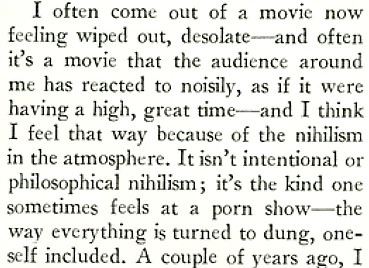“I keep meeting people — typically, men in their late 20s and early 30s — who say, ‘You know, I just don’t have the impulse to go to a movie anymore,’ or ‘There aren’t any movies any more, are there?'” This is New Yorker critic Pauline Kael writing 37 years ago about a certain spirit falling away in movies and moviegoers, and how Hollywood’s tendency to flaunt crudeness and brutality was turning off audiences, and how others seemed to “like movies that do all the work for them” and were revelling in the lack of feeling and finesse.

I especially relate to the line about how Kael will “often come out of a movie feeling wiped out, desolate…and I think I feel that way because of the nihilism in the atmosphere.”
The article, called “On The Future of Movies” and available in the current The New Yorker online, was written in August 1974, and all you can think about as you read it (and it’s an excellent essay up and down) is “wait, wait…this was smack dab in the middle of the greatest era in American movies!” It certainly offers perspective. Here was a brilliant critic kvetching with great feeling and articulation, and she didn’t know what she was in the middle of. She certainly couldn’t have foreseen what was to come in the ’90s and the aughts. She couldn’t have seen how poisoning and corporate-minded and utterly soulless most commercial films would eventually become. She had no idea.
Here, by the way, is her famous October 1967 Bonnie and Clyde piece.
